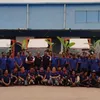This Bengaluru startup is providing continuum healthcare solutions to patients with chronic conditions
Founded in 2015, Sukino Healthcare offers out-of-hospital recuperative, rehabilitative, and palliative care to patients with chronic conditions.
Entrepreneur Rajinish Menon’s mother was fighting cardiovascular and other neurological conditions. During this time, Rajinish witnessed the lack of a good healthcare system in the country. He realised that while help was available at times, constant care was not available.
“Each time it was a phenomenal seesaw moment. While there was hope at times and help all-round, at other times we just did not know what to do. Here, in India, we have piecemeal working systems, and it is left to the patient’s families to sew them together,” he tells YourStory.
Having faced the issue personally, Rajinish launched continuum healthcare provider in 2015. The Bengaluru-based startup offers out-of-hospital recuperative, rehabilitative, and palliative care to patients at any transitory stage of their illness for fast recovery. Rajinish is a chartered accountant with over two decades of industry experience. Prior to starting up, he was leading the startup partner evangelism for Microsoft.
“Be it long-term management for chronic illnesses or post-acute illness recuperation, the care is provided either at our continuum of care facilities or at the home of patients,” Rajinish says.
At present, the startup has two continuum care facilities in Bengaluru and Kochi. Sukino claims to have treated 5,000 patients to date since inception.

Team Sukino Healthcare [Image Credit: Sukino Healthcare]
Striving to make people happy
According to Rajinish, Sukino was founded to reduce the emotional and physical pain of the patients and to also support their family members. The end goal is to help them cope with the situation and smile again.
Inspired by the Sanskrit shloka ‘Om Lokah Samastah Sukhino Bhavantu,’ meaning all beings everywhere are happy and free, Rajinish named the startup Sukino.
Sukino Healthcare provides continuity of treatments suggested by the primary physician of the patient. Rajinish adds that the concerned doctor is always kept in the loop throughout the continuum care process.
“The onboarding process begins with a detailed assessment of the patient to ensure a smooth transition. Following this, our team of doctors and therapists discuss the next line of action with the primary physician to ensure the treatment is executed as per plan. Each patient is provided with a 24/7 healthcare assistant while a multidisciplinary team of ICU trained nurses, caregivers, clinical dieticians, and psychologists work together to help the patients recover as well as feel comfortable and informed,” he adds.
While Sukino’s services can be availed by any patient who needs post-hospital care, the founder says the services are most important for patients suffering from chronic illnesses like neurological impairments, kidney diseases, cardiac disorders, cancer, respiratory distress, and postoperative clinical care. The startup has 300 members at present.
According to a June 2020 report by Grand View Research, the Indian home healthcare market (including therapeutic, diagnostic, mobility assist care) size stood at $5.2 billion in 2019 and is expected to expand at a compound annual growth rate (CAGR) of 19.2 percent from 2020 to 2027. Similar to Sukino, Kolkata-based Care Continuum is also involved in providing out-of-hospital care however its main focus is on providing care to elderly people.

Illustration: YS Design
Business and more
According to Rajinish, the startup operates on an individual package model where the patients are charged for the number of days they use Sukino’s services.
The startup’s pricing starts from Rs 1,000 per day for basic care at home and goes up to Rs 4,500 for comprehensive rehabilitative and palliative care at its continuum of care facility.
The founder and CEO claims the startup is on its way to clocking in a revenue of $4 million run rate.
“Our growth YoY has been ranging between 60-75 percent since 2016, and we expect this growth to continue as we see a huge demand for our module of services,” he adds.
Rajinish started Sukino with an initial investment of Rs 10 lakh. The startup has also raised $1.5 million in its first round of funding from marquee HNIs including Kris Gopalakrishnan, who has invested through his family office, Pratithi Investment Trust.
The founder reveals the startup is now looking to expand its services and also its geographical presence. Apart from strengthening its foothold in the existing markets, it is also looking to expand to other cities in South India with higher elderly populations including Chennai, Hyderabad, and Vijayawada among others.
“We also intend to provide more services in the segment of oncology, day-time ambulatory services, and ICU care at home for our patrons,” he adds.
Edited by Megha Reddy



![[Startup Bharat] Jiyyo Mitra e-Clinic is helping patients in rural and semi-urban areas access better healthcare](https://images.yourstory.com/cs/2/b094ec506da611eab285b7ee8106293d/imageonline-co-logoadded3-1611668427727.jpg?fm=png&auto=format&h=100&w=100&crop=entropy&fit=crop)





